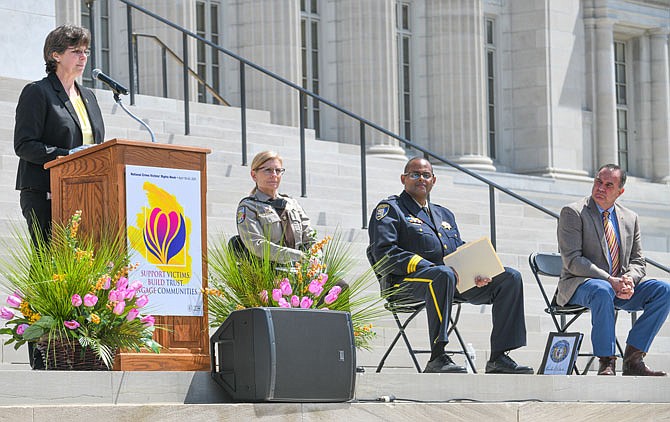Chris Wilson's life experiences have shaped him.
None more so than his only sister's tragic 1989 death at the hands of a young man playing with a handgun.
"It was tragic. It was senseless. And, it was traumatizing," Wilson told about 200 people gathered Thursday on the south lawn of the Capitol for the annual Missouri Crime Victims' Rights Ceremony. "Her death left a hole in my family that exists to this day."
The Missouri Department of Public Safety called attention to the state's new program to protect victims and witnesses of violent crime and their families who might be endangered for providing testimony about their cases during the ceremony.
The theme for the event was "Support victims. Build trust. And engage communities," said Michelle Parks, senior programs specialist for the DPS Office for Victims of Crime.
New this year, Parks said, is a Witness Protection Fund that the Legislature passed in 2020 to pay for hotels, motels, emergency meals, and other items needed when protecting victims and witnesses of violent crime.
The state has recently begun approving claims applications for the funding, she said.
Like most victims, a violent crime was the Wilson family's introduction to the criminal justice system. It was confusing and frustrating. It was a system the family knew little about.
And it often seemed unfair and uncaring to Wilson's family and his sister's memory.
However, within the system were prosecutors who did what they could to seek justice for his sister, he said.
Thirty years later, Wilson is the prosecuting attorney for Callaway County.
"My perspective has changed, but here's what I know supporting victims is an incredibly important part of seeking justice," he said. "It can sometimes be very, very difficult as we work with people who have suffered unimaginable loss and trauma."
The work may sometimes be thankless, but is often rewarding, he said.
Prosecutors should always do all they can to support victims.
Building trust in any relationship takes time and work - more so with people who have suffered incredible losses.
Simple steps, like keeping a victim up to date, help build trust.
On the other hand, it can be difficult for a prosecutor to listen to a victim who is angry, upset and needs to be heard, even if they don't have the answers, Wilson said.
"These are hard conversations at times, but we should do our best to explain the actions that we take," he said.
And, it's important for courts to hear victims' concerns, he continued.
"Communication, listening and respect all build trust and go a long way to our seeking justice," Wilson said.
More than ever, it is important that prosecutors engage communities and be as transparent as the law will allow, he said, so there can be trust with not only victims, but the community at large.
Wilson's story is unique, Lt. Gov. Mike Kehoe said. It's a story Kehoe heard when the two first ran for public offices in 2010.
The story affected him, Kehoe said.
"A lot of people run for public office for one reason or the other. But, somebody whose life was marred by tragedy led to an incredible pure heart," Kehoe said.
Wilson's conscience and his family and his calling, turned the memory of that tragedy into motivation to advance people's rights, Kehoe said.
"We all know that violent crimes impact families, neighborhoods and communities," he said. "We also know that each group is affected differently when violent crime occurs. A lot of work goes on behind the scenes to help put these families, neighborhoods and communities back together."
Missouri is better when its people working together to cultivate safety within communities, protects victims and ensures the rights of victims, he said.
Kehoe assured listeners state leadership is committed to supporting victims and their families. He pointed out that as the ceremony took place on the Capitol steps, lawmakers were inside the building setting aside the initial $2 million in seed money for the WPF, as Gov. Mike Parson had requested.
At the same time, lawmakers were approving Victims of Crime Act funding, he said. The Missouri Department of Social Services administers VOCA funds at the state level, according to the DSS website, dss.mo.gov/dfas/victims-of-crime-act/.
It provides matching grants to support direct services to victims of crime through the state, assist crime victims and demonstrate support for victims.
"Today we are here to recognize and thank the network of Missourians, from the road officer - who is the first one on the scene, to the detective connecting the dots, to the prosecutor pursuing justice, to the advocate helping piece lives back together," Kehoe said. "We also acknowledge the victims' support family members and the witnesses and bystanders who are willing to come forward and assure justice is served."

